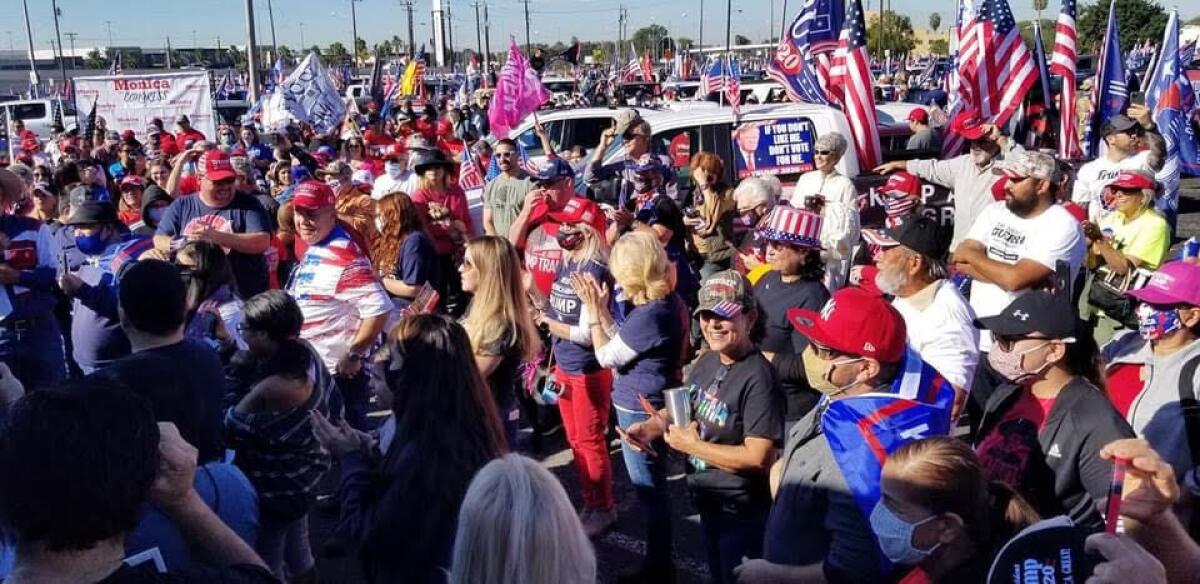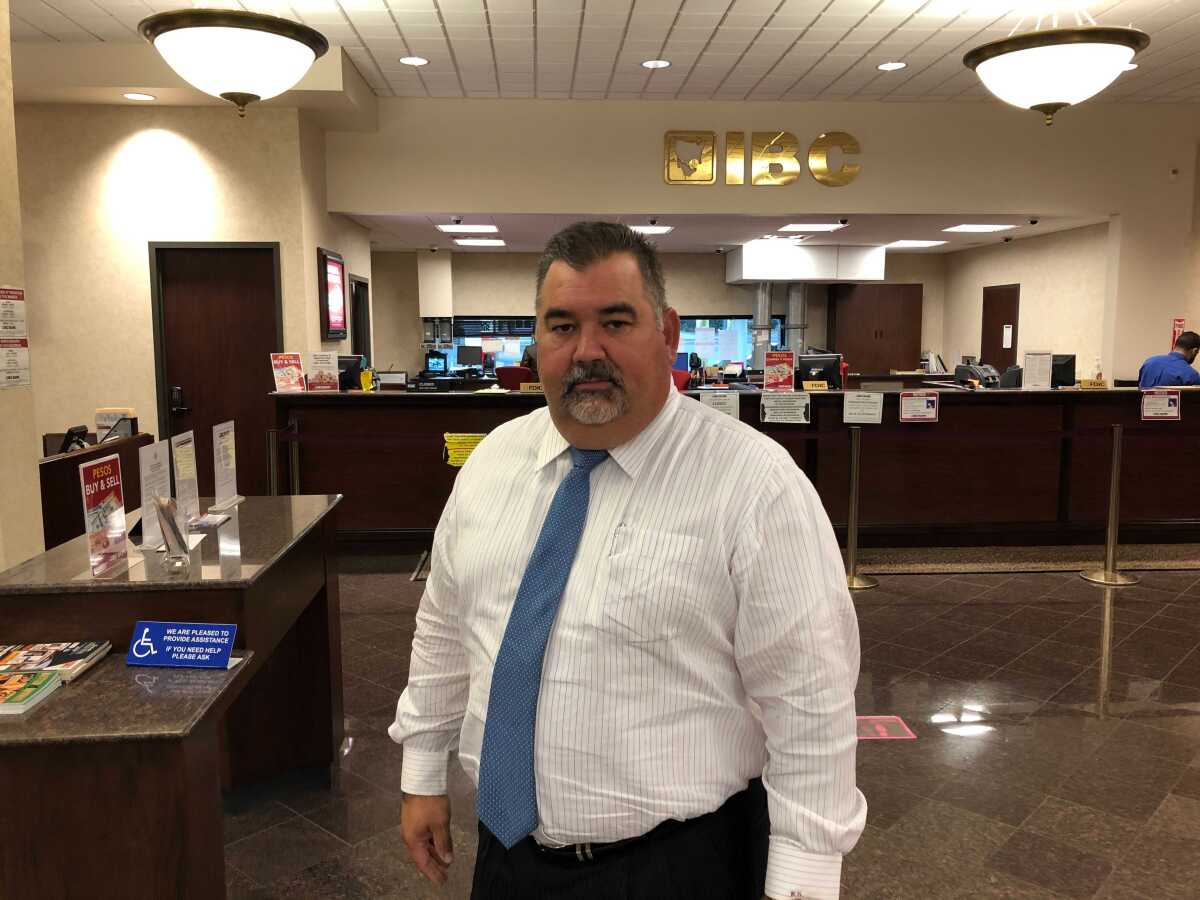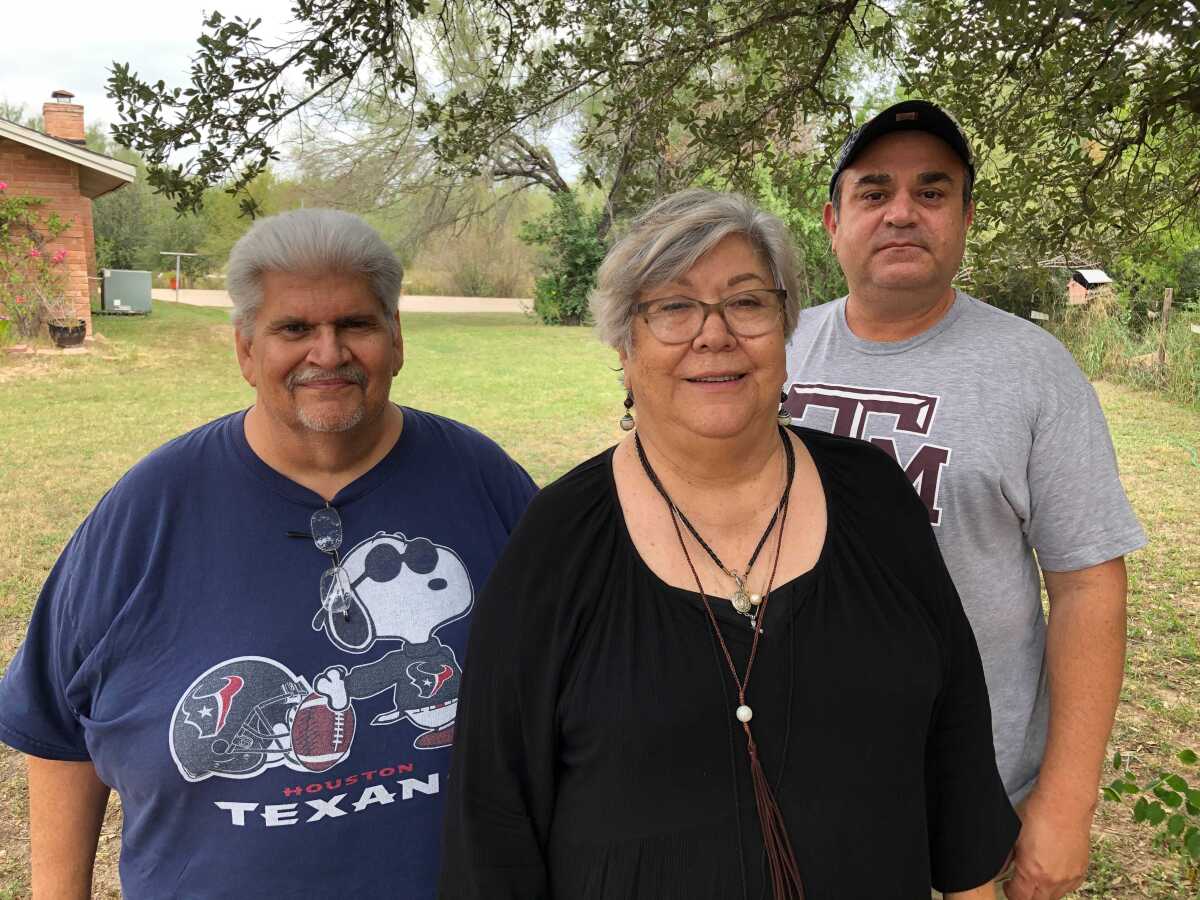‘We’ve only started’: How Latino support for Trump grew in Texas borderlands

McALLEN, Texas — When more than 4,000 vehicles showed up here for a “Trump train” parade over the Fourth of July weekend, even the organizers were shocked.
The Rio Grande Valley, with some of the highest concentrations of Latinos in the country, had long been unfriendly territory for Republicans.
“Everybody was surprised,” said Rosbell “Ross” Barrera, 54, a retired Army colonel who helped organize similar events in neighboring Starr County.
The rallies, which spawned others along the border, were a sign of things to come on election day. From Brownsville to El Paso, a president who has routinely disparaged Mexicans strengthened his support among Mexican Americans.
In 2016, Donald Trump lost all 18 Texas counties where Latinos make up at least 80% of the population. This time he won five of them and closed the gap considerably in the rest.
He triumphed over Joe Biden in rural Zapata County — where Hillary Clinton had beaten him by 33 points — and narrowly lost Starr County, where Clinton’s winning margin was 60 points. In all, he took 39% of the vote in those 18 counties, up from 29% in 2016.

“You could feel the change even while we were at the polls,” said Alma Perez, 34, president of 230-member Hidalgo County Young Republicans, which has grown into one of the state’s largest chapters.
“In previous years, we weren’t much of a threat,” she said. “The silent majority is not so silent anymore.”
President Trump’s unlikely success was largely due to his defense of the oil industry and law enforcement as well as concerns that the Democratic Party was moving too far to the left.
That is the picture that emerged from interviews with voters and officials in the Rio Grande Valley, where more than half of the 1.3 million residents live in poverty, and oil field and law enforcement jobs buoy entire families.

Barrera, who volunteered outside the polls during early voting in Starr County, said the top reason voters told him they chose Trump was the economy.
Some were encouraged by stimulus checks that featured Trump’s signature, a boost during a pandemic that shuttered local businesses and killed nearly 3,000.
Many more were worried about oil field jobs, where workers without high school diplomas can earn six figures.
“Husbands, sons, brothers — they go and work in Midland-Odessa,” Barrera said. “There’s not a lot of other lucrative jobs.”
The benefits of the oil fields trickle down. New trucks fill the parking lot of the Walmart in Rio Grande City, the Starr County seat. New houses dot ranchland there and in Zapata County.
“Those folks got freaked out on the issue of whether Biden was going to eliminate fracking,” said Gilberto Hinojosa, chair of the Texas Democratic Party, who lives in the Rio Grande Valley.
Trump also benefited from a network of Border Patrol agents, families and unions, whose ranks have grown in recent years as the agency expanded in south Texas. “He had his ready-made army down here,” Hinojosa said.
In interviews, many voters said they were willing to overlook Trump’s hostile rhetoric against Mexicans, even if it caused rifts with some local Democrats.
“They want to be accepted by people in Austin or D.C.,” retired social worker and teacher Maria Elia Ramos said of area Democrats. “Who cares? We live here.”

The Rio Grande City resident, 72, said relatives belittled her on Facebook, using a Mexican idiom — “You have a nopal on your forehead” — to accuse her of being a self-hating Latina pretending to be white.
Ramos, who before the pandemic spent summers in Mexico, shrugged off the critique as she sat in her living room, surrounded by embroidered pillows and pottery she’d brought back.
Being a proud Mexican American doesn’t mean voting a straight Democratic ticket, she said: “We have a right to decide.”
“Our family values are more in line with Republicans’,” she said.
Democrats in south Texas had consolidated power over the years by remaining moderate, but lost support recently as the national party shifted left.
Mayra Flores, 33, a medical worker and mother of four in McAllen, left the Democratic Party a decade ago. She said she opposes abortion, supports law enforcement and believes in legal immigration — the way she moved from Mexico to Texas with her parents when she was 6.
That is the message she relayed to her 40,000 Facebook followers and the people she spoke to in Spanish for a phone-banking campaign for Trump.
“A lot of them here have brothers, sisters who are Border Patrol agents,” she said. “So when you attack law enforcement, you’re attacking their family. Democrats forgot about that.”
When voters told her they hated the way the president talked about Mexicans and immigrants, she had an answer for them.
“I’d tell them they needed to put their values first, focus on the policies — ‘Are those policies helping you?’” she said. “We were able to convince a lot of people.”
After Trump won Zapata County, local IBC Bank President Ricardo “Rick” Ramirez, who had voted for Trump with his 18-year-old daughter, posted a comment on Facebook to the Texas land commissioner, George P. Bush, grandson of the 41st president.
“It’s been a long time since you’ve come down here,” Ramirez wrote.
He was thrilled to see Bush respond almost immediately.
“We’re coming soon,” he wrote in Spanish.
Republican leaders said the surge of Trump support in border communities presented a wider opportunity.
“We’re going to start focusing on how do we build the next generation of conservative candidates in the Rio Grande Valley,” said Texas GOP Chairman Allen West, the former congressman.
West, who is Black, said Democrats can’t take minorities for granted in Texas. He was especially excited to see Zapata County flip, he said: “Now we’ve just got to make sure it stays that way.”
Aron Peña III, a Hidalgo County GOP official, said he reached voters through gun groups, Boy and Girl Scout parents and Bible studies — the kinds of community organizing strategies he learned when he was a Democrat working for the Obama campaign in 2008.
Young Republican clubs have grown at the University of Texas Rio Grande Valley and South Texas College. Now Peña is trying to recruit more local GOP candidates to reduce the number of uncontested elections.
Locals drove another “Trump train” of 40 vehicles through McAllen on Wednesday night. Another parade is planned Saturday.
“We’ve only started,” Peña said. “We’ve never had this type of enthusiasm. I think this will only grow.”
Times staff writer Ryan Murphy in Los Angeles contributed to this report.
More to Read
Sign up for Essential California
The most important California stories and recommendations in your inbox every morning.
You may occasionally receive promotional content from the Los Angeles Times.











